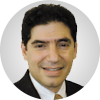At one time I was the medical director at various track meets. Sometimes these meets were held far from my practice in NYC. Wherever we went, I would search for and recruit local chiropractors to work at these meets. It seemed like common courtesy for me to involve local doctors when I was the stranger. Recently, the University of Bridgeport (UB) hosted a collegiate championship event. The medical staff did not make an effort to recruit either doctors or students from our chiropractic college. I figured that was because the medical director was an MD and had an animosity toward chiropractors. Imagine my surprise when I found out the medical director was a chiropractor from the Midwest! He could not attend the championships, but he had recruited two DCs from other states to work at the event. It was even more surprising when I found out that chiropractic students from another college were members of the staff. The lack of courtesy to our college was unbelievable, and something I could never bring myself to do.
Last semester, a well-known chiropractic speaker came to give a talk at the chiropractic college at UB. When he started the talk, he said that he believed in diversity in the chiropractic profession. That's a good thing. He noted that there is a continuum upon which the chiropractor's philosophy of chiropractic lies - from straight to mixer. To describe this, he drew a horizontal line on the chalkboard, with vertical lines at each end denoting "straight" and "mixer." He described himself as so far past the line he had drawn for straight, that he was out of the room. After talking awhile about how valuable diversity in the profession is, he went on to his main topic - subluxation. When he concluded his talk, he said, "If you don't believe in the subluxation, you don't belong in a chiropractic college." It is rather inconsistent to say on one hand that one believes in diversity of thought within the profession; and on the other, to say that if you do not believe in the subluxation, you do not belong in chiropractic college. Not exactly a courteous way to talk about one's colleagues.
This sort of lack of courtesy I have noticed in other venues, too. If a chiropractor in any way, shape or form is critical of our profession, the common retort is, "Why don't you leave the profession if you hate it so much?" People have used this in reply to some of my ethics columns, and to others who have commented positively. I have also heard this said to chiropractors who have published journal articles that are critical of the profession. Doctors who have been outspoken in the media about problems within the profession likewise have been told to leave the profession if they do not like it.
I am a member of the American College of Chiropractic Consultants (ACCC) and edit its newsletter. The ACCC membership includes chiropractors who conduct various types of peer review. One could write a book about all the names these doctors have been called. There is continual suggestion that these docs do this because of some inherent dislike for chiropractic. This could not be further from the truth. I have to say I have met very few chiropractors in my life who exhibit a greater love for the profession and are more concerned about its improvement.
Professionals are called that because they "profess" to have knowledge that the layperson does not have. Thus, only a professional is qualified, by virtue of his or her specialized knowledge, to judge another member of that particular profession. This is why professions are both privileged and mandated to be self-regulating. It is a noble and obviously thankless job to help regulate one's own profession. Whether it is peer review in the private sector, or peer review in the public sector by the regulatory boards, these doctors are often vilified for their service to our profession and the public.
The responses critics, peer-reviewers and regulators receive remind me of the response to Vietnam War protestors: "America - love it or leave it." To the protestors, the protest was an act of love of country. If they really did hate the U.S., they would have left - and some actually chose to. Likewise, there are those who, for whatever reason, have decided they do hate this profession - and they have left. Those who leave are similar to the spouses in an acrimonious divorce: They could not say a nice thing about their ex-spouse (or ex-profession) if they tried. The critics who remain are showing their true love for the profession by being critics. Our profession cannot improve if we do not know what the problems are.
It is often said that only a true friend will tell you that your fly is down or that you have bad breath. When a friend does that, do you tell them to stop being a friend? No! You say, "thank you," because it's the courteous thing to do.
Stephen Perle, DC, MS
Bridgeport, Connecticut
Click here for previous articles by Stephen M. Perle, DC, MS.





